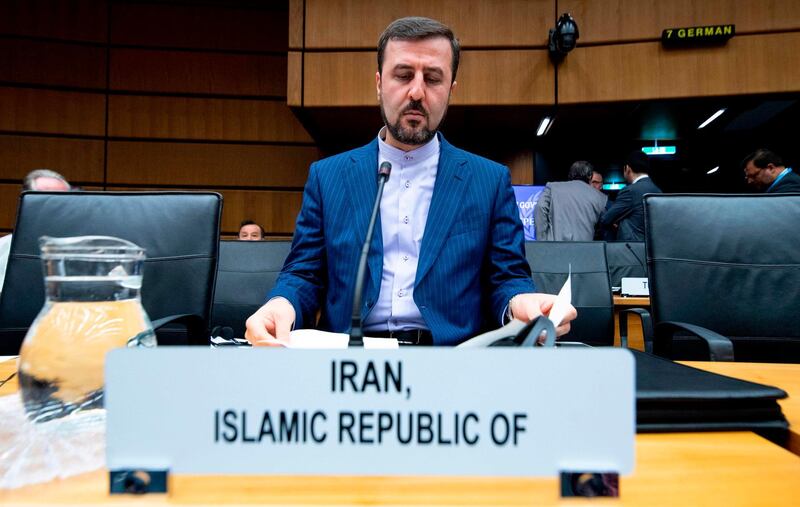Iran has asked the United Nations to oversee Israel’s secretive nuclear programme and condemns its threats against the Islamic republic, state media reported on Thursday.
In August, Israeli Prime Minister Benjamin Netanyahu delivered a speech from the Dimona atomic reactor, warning the country’s foes that it has the capabilities to destroy them. He was making a reference to Israel’s suspected nuclear programme.
The country never admits or denies the existence of a nuclear programme and maintains a policy of “strategic ambiguity” so as not to allow any sensitive information to fall into enemy hands.
“The United Nations members should not turn a blind eye to these threats and must take firms actions to eliminate all Israeli nuclear weapons,” Fars news agency quoted Iran's ambassador to the United Nations Gholamali Khoshrou as saying in letters to the UN secretary general and the UN Security Council.
Mr Khoshrou asked the United Nations to force Israel to join the Nuclear Non-Proliferation Treaty (NPT) and bring its nuclear programme under supervision of the International Atomic Energy Agency (IAEA), a UN atomic watchdog.
Israel, which is outside the NPT, neither confirms nor denies having the bomb, a decades-old ambiguity policy that it says keeps hostile neighbours in check while avoiding the kind of public provocations that can spark regional arms races.
Iran regularly threatens Israel with destruction but Mr Netanyahu appeared to make a rare admission about his country’s nuclear arsenal.
“Those who threaten to wipe us out put themselves in a similar danger, and in any event will not achieve their goal,” he said at the ceremony.
On Thursday, Israel said it is upgrading and reinforcing its nuclear facilities to withstand attacks to counter Iranian threats to strike the Israel’s nuclear sites.
“We cannot ignore the repeated and explicit threats, made by Iran and its proxies, to attack Israel’s nuclear sites,” Zeev Snir, the head of the country’s Atomic Energy Commission, said in a speech Tuesday to the 62nd General Conference of the International Atomic Energy Agency in Vienna. “These outrageous threats require Israel to take action and continue to protect and defend its nuclear facilities.”
__________
Read more:
Hezbollah leader says group will stay in Syria until further notice
Hezbollah is flaunting its support for Yemen’s Houthis
__________
Iran’s own nuclear ambitions have been the centre of international diplomacy for years. After Israeli lobbying, the US earlier this year withdrew from the landmark nuclear deal signed between Tehran and world powers in July 2015.
That deal swapped limits on Tehran’s nuclear programme for the lifting of crippling international sanctions. Israel is now lobbying other world powers to follow US President Donald Trump in leaving the agreement.
UAE Ambassador to the IAEA, Hamad Alkaabi, told the nuclear body on Thursday that the nuclear deal was not satisfactory.
“In relationship to the JCPOA (Joint Comprehensive Plan Of Action) concluded with Iran, my country, like many, has hoped that such Agreement would address long held nuclear concerns and moderate Iran’s regional behavior,” he said.
“Unfortunately, this was not the case. We call on Iran to build further confidence in the peaceful nature of its nuclear activities and to refrain from the actions that continue to threaten the peace and stability of the region.”
Israel believes the agreement is insufficient for denying their arch-foe the means to eventually get the bomb. It views Iran as its number one national security concern.
The Iranian regime backs the Lebanese militia Hezbollah and the Palestinian movement Hamas. Both groups have fought four wars with Israel since 2006. Its reinforcement of Damascus during Syria’s seven-year civil war is seen by the Netanyahu government as a further Iranian deployment on Israel’s borders.





